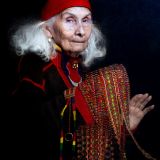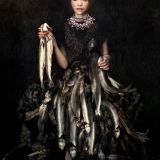Cooper & Gorfer
From the Tales…
Seebad Enge
„We share a deeply rooted interest in the female story and how our experiences and socio-cultural background influence our sense of self. Our work strives to articulate the unapparent and the hidden desires we hold dear, paying tribute to the many layers of life and memories that shape us.“ Cooper & Gorfer
In their work, the Austro-American artist duo, Sarah Cooper and Nina Gorfer, focuses on the female aspects of cultural identity. Cooper & Gorfer revive the tradition of portrait painting by deconstructing the (hi)story of the portrayed. Their photo-based photo collages start from anthropological-type research in an attempt to condense the personal and collective stories of their protagonists in one image. Like in art-historical mannerism and surrealism, they articulate the subconscious aspects of a person and in their photos dissect our ideas of identity and how our cultural heritage informs our actions and our perception of the world. Cooper & Gorfer strain observable reality through a filter of memories, moods and wounds.
Cooper & Gorfer started to collaborate in 2006. Their artwork has been widely exhibited at museums: Hasselblad Center, NOMA New Orleans Museum of Art, Nuuk Art Museum in Greenland, The National Museum of Photography Copenhagen, MAK Frankfurt, The Arctic Conference St. Petersburg, and Fotografiska, amongst others. Cooper & Gorfer’s work is included in several private and museum collections, including the National Gallery of Iceland. They were awarded the Deutscher Fotobuchpreis 2018 and are Fuji Ambassadors.
Curated by Lois Lammerhuber / Printed by ![]()
Discover here contributions of ETH Zurich to the Sustainable Development Goal (SDG) 5:
Building equity into the food system
Johanna Jacobi
Professor Johanna Jacobi has family roots in Bolivia and Germany. She has worked and lived in Europe, the Americas, Africa, and India. She believes deeply in participatory processes and how they can be used to design sustainable, fair farming methods and food systems based on different types of knowledge. Johanna analyses how imbalances in political and market power drive the global food system to a crisis point.
Exposing unequal power relationships
Her work traces the main causes of that crisis back to power relationships that are multi-dimensional and increasingly off-balance. At its core, this is about unequal participation in decision-making processes between groups working within the food system which may differ in gender, age, and culture. To address this, where possible Johanna focuses on gender roles and cultural issues in her agroecological research.
Together with her research group at ETH Zurich and international partners, Johanna makes connections between various aspects of the food system visible. Concerned by the discord she sees between human activity and the rest of life on our planet, she strives to reveal contradictions as well as alternatives that would otherwise go unnoticed.
Cooperatives and deliberation
In Brazil and Kenya, Johanna and her research partners were able to show, for instance, how the production of cheese and other dairy products can become fairer and more democratic, and how it can generate income for artisanal producers, mostly women. Through participatory action research and collaborative partnerships with local NGOs, they helped establish cooperatives that allow small-scale dairy farmers to market their products to customers directly, reducing their dependence on intermediaries.
Johanna has in her toolbox a powerful lever and a „partial antidote“ to unequal power relations: deliberation, which is the citizens’ political conversation, collective decision-making, and participation in political processes. Her systemic agroecological research – which gives equal value to social and cultural dimensions alongside ecological and economic ones – shows that when local women and men build their food systems together, there is greater security, sustainability, and equity in the system.
“Our aim is to contribute to a sustainable and equitable transformation of agricultural and food systems through social-ecological systems research.”
Prof. Dr Johanna Jacobi, Professor of Agroecological Transitions at ETH Zurich
Promoting equality within ETH Zürich
Raphaela Hettlage
ETH Zurich’s diversity team is multidisciplinary: Dr. Raphaela Hettlage and her colleagues combine competences from the humanities and social sciences, covering a range of fields from history to psychology, sociology, ethnology, political science, and gender studies. They are passionate and motivated to contribute to a more equitable world.
How does ETH Zürich work for gender equality?
ETH Diversity is the university’s internal office responsible for promoting equity within the ETH Zurich community. It does this by contributing ideas, responding to relevant inquiries, and exploring opportunities to implement measures that further this goal. The office advises ETH Zurich’s executive board on policies surrounding equity, diversity, and inclusion, as well as activities that can foster a cultural shift in order to encourage the ETH community to value equal opportunity for all. As part of this work, ETH Diversity helps to break down barriers that keep certain groups from succeeding in academia. This matters because any society, organisation, or scientific endeavour that adheres to the principles of equal opportunities is not only more just, but can also leverage academic talent more effectively.
The work of ETH Diversity contributes to several SDGs. It aims for inclusive and equitable quality education (SDG 4); promotes gender equality within academia (SDG 5); reduces inequalities within the academic world (SDG 10); and fosters an accountable and inclusive environment at ETH Zurich (SDG 16). The office contributes towards reaching other global goals indirectly, by nurturing good-quality education and working conditions that create space for SDG-relevant research .
Supporting diversity is not only a question of justice: research shows that it leads to better education and better research, with tangible benefits for academia and the society.
“Initiatives intended to address barriers to equal opportunities are not only for underrepresented groups, but foster a better work and study environment for everyone!”
Dr. Raphaela Hettlage, Head ETH Diversity
open your eyes festival buerau
Botenaustrasse 42
9443 Widnau
Switzerland
Phone: +41 44 218 11 03




